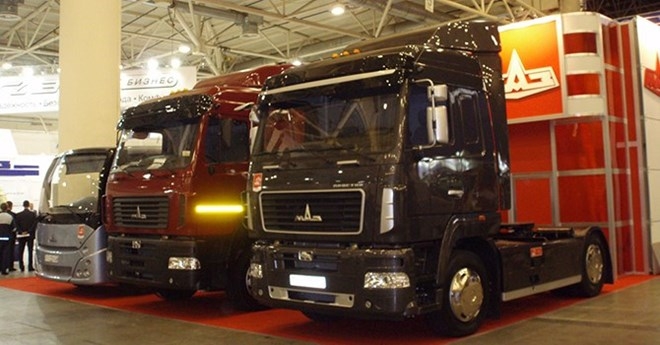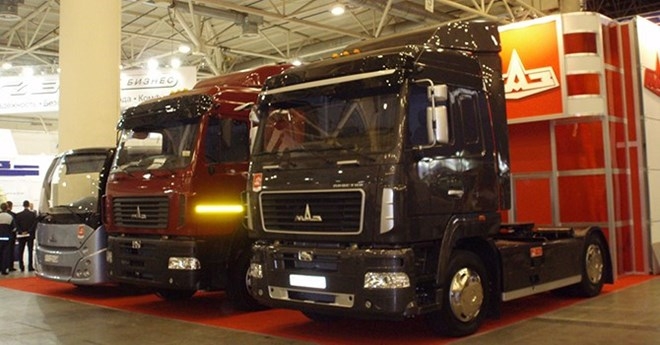
Business cooperation between Vietnam and Belarus will be further developed following trade deals inked between the two sides in the northern province of Hung Yen on March 29 in the presence of Belarusian Deputy Prime Minister Vladimir Semashko.

Trucks assembled in MAZ Asia
joint venture. (Photo: maz.by)
A US$60 million deal on supplying trucks and specialised cars
and memorandum of understanding on establishing a dairy plant in the province
were signed on the day.
joining in free trade agreements has
opened up opportunities for collaboration between the two countries, Deputy PM
Semashko said, recommending that Belarus
and Vietnam
should set up more joint ventures based on the principal of mutual benefits.
The Belarusian Government chose Hung Yen
as the location for MAZ Asia joint venture to manufacture and assembly
automobiles and the dairy plant, he said, adding that it is considering the
construction of a bus assembling factory in the province.
Secretary of the provincial Party
Committee Do Tien Sy lauded Belarus’s
socio-economic achievements, especially in automobile industry, agriculture and
dairy and farm produce processing, expressing his hope that Belarus will
land more high-tech projects in the province to boost its development.
Meanwhile, Chairman of the provincial
People’s Committee Nguyen Van Phong said that the province is focusing on
developing infrastructure and industrial parks to lure more investments.
Currently, the province is home to 11
industrial parks, accommodating over 1,700 domestic and foreign projects, he
said.
Phong suggested the Belarusian side
invest in a fertiliser plant in the province while creating favourable
conditions for Hung Yen to ship its agricultural products to the nation.
Hung Yen will create optimal conditions
and adopt preferential policies so that Belarusian projects can become
operational soon, he stressed.
On the occasion, Deputy PM Semashko and his
working delegation visited the factory of MAZ Asia joint venture, which is under
construction in Kim Dong district.
Source: NDO
According to data from the Hoa Binh Provincial Party Committee, the industrial production index for the first six months of 2025 is estimated to have increased by 20% compared to the same period last year. This marks the highest year-on-year growth rate for this period since 2020.
In the first six months of 2025, Hoa Binh province’s export turnover was estimated at 1.145 billion USD, marking an 18.11% increase compared to the same period in 2024. Import turnover was estimated at $ 804 million, a 17.15% increase, which helped the province maintain a positive trade balance.
The lives of the ethnic minority farmers in Tan Lac district have gradually improved thanks to the new directions in agricultural production. This is a testament to the collective strength fostered through the professional associations and groups implemented by various levels of the district’s Farmers’ Union.
With the motto the "product quality comes first,” after nearly one year of establishment and operation, Muong village’s Clean Food Agricultural and Commercial Cooperative, located in Cau Hamlet, Hung Son Commune (Kim Boi district), has launched reputable, high-quality agricultural products to the market that are well-received by consumers. The products such as Muong village’s pork sausage, salt-cured chicken, and salt-cured pork hocks have gradually carved out a place in the market and they are on the path to obtaining the OCOP certification.
In the past, the phrase "bumper harvest, rock-bottom prices" was a familiar refrain for Vietnamese farmers engaged in fragmented, small-scale agriculture. But today, a new spirit is emerging across rural areas of Hoa Binh province - one of collaboration, organisation, and collective economic models that provide a stable foundation for production.
Maintaining growing area codes and packing facility codes in accordance with regulations is a mandatory requirement for agricultural products to be eligible for export. Recently, the Department of Agriculture and Environment of Hoa Binh province has intensified technical supervision of designated farming areas and packing facilities to safeguard the "green passport" that enables its products to access international markets.



